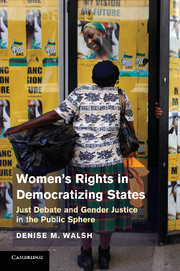1 - Democratization and Just Debate
Published online by Cambridge University Press: 06 December 2010
Summary
“Democracy is not enough. We want gender justice.”
Banner at the Beijing Plus Five United Nations Conference, New York, 2000INTRODUCTION
In a rare consensus, gender scholars now agree that democratization is not associated with significant advances in women's rights (e.g., Jaquette and Wolchik 1998; Tripp, Casimiro, Kwesiga, and Mungwa 2009; Waylen 2007). Why not? In this book, I argue that advances in women's rights occur when the quality of democracy is good, meaning debate conditions are open and inclusive. Under conditions of fully open and inclusive debate, everyone who wishes to exchange ideas about issues of common concern has the opportunity to do so. Those discussions shape public opinion and influence state policy making. I refer to these ideal conditions as just debate.
Although no democratizing state fulfills these ideals, debate conditions in democratizing states can vary significantly across countries and across time within countries, from quite limited to remarkably open and inclusive. Through a series of paired comparisons of select time periods in democratizing Poland, Chile, and South Africa, I find that when debate conditions are more open and inclusive, state support for gender justice is greater. The reason is simple. Better debate conditions mean a more diverse range of women have the opportunity to speak about their interests and be heard. As a result, more demands for women's rights enter public debate. Because politicians facing elections aim to demonstrate responsiveness to public debate they increasingly support policies and legislation advancing women's rights.
- Type
- Chapter
- Information
- Women’s Rights in Democratizing StatesJust Debate and Gender Justice in the Public Sphere, pp. 3 - 28Publisher: Cambridge University PressPrint publication year: 2010



